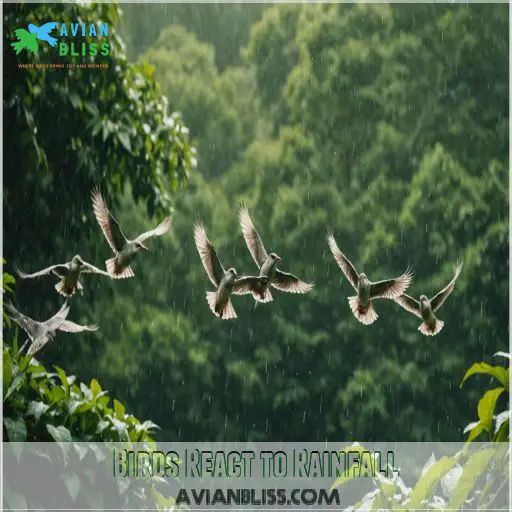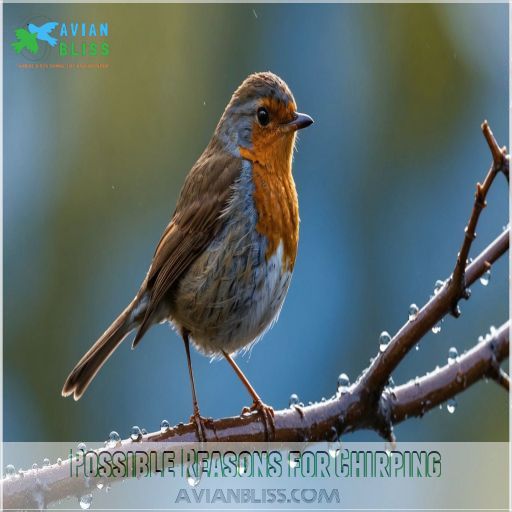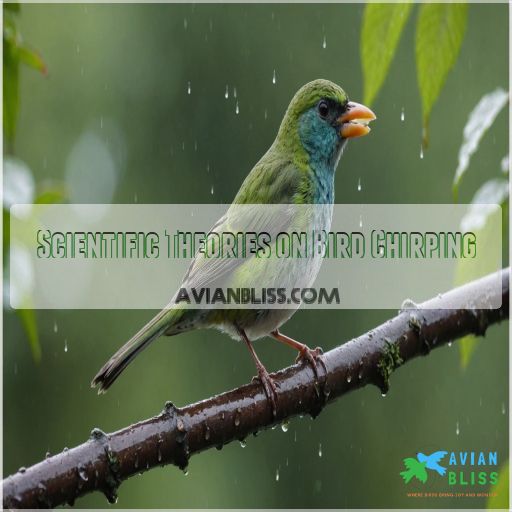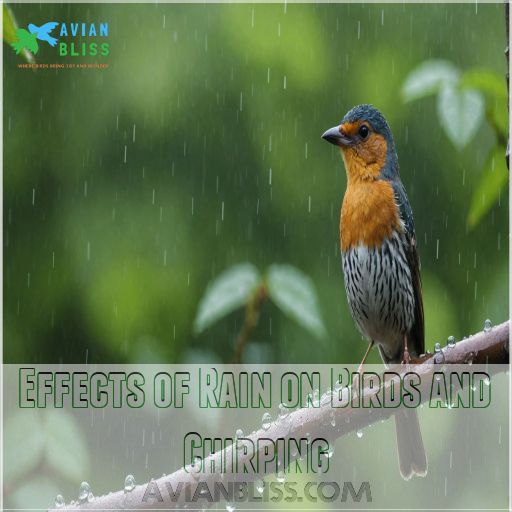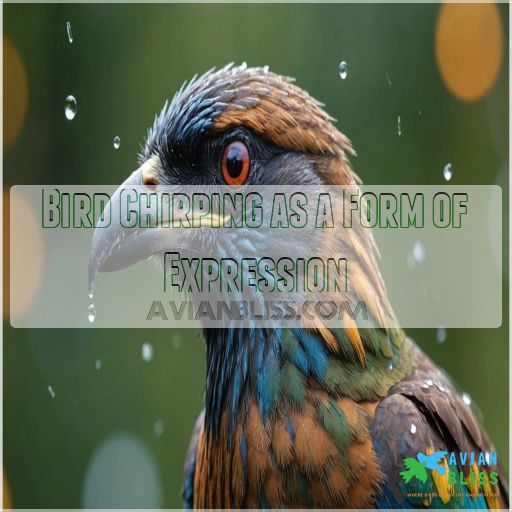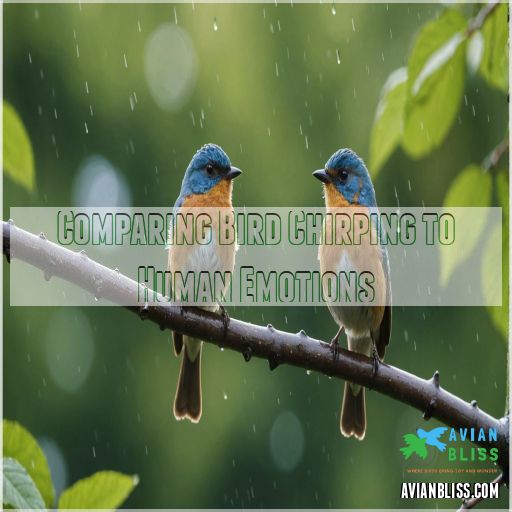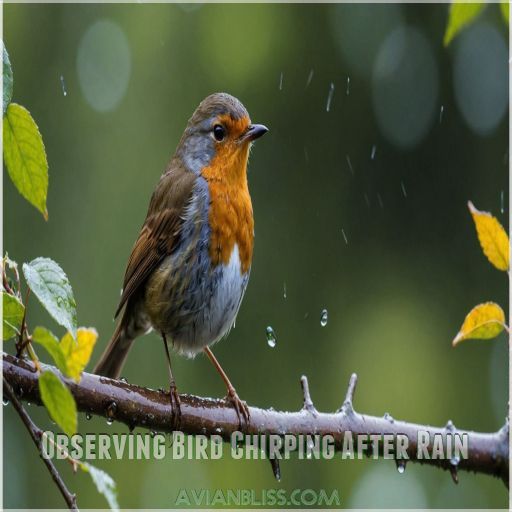This site is supported by our readers. We may earn a commission, at no cost to you, if you purchase through links.
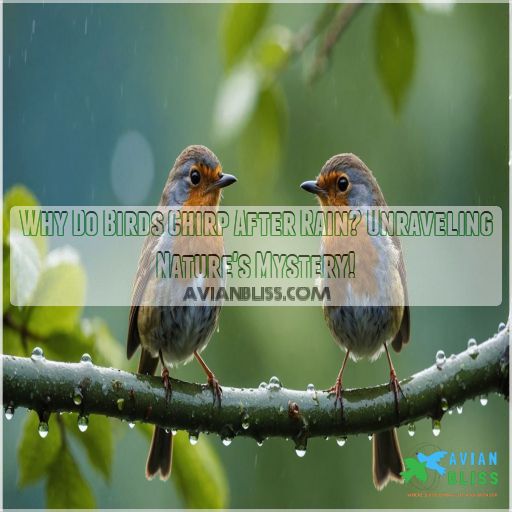
Post-rain chirping also strengthens social bonds, enhancing group camaraderie. Males in particular put on quite the vocal performance for this purpose. Plus, there’s a burst of biological stimuli—it’s like the rain flips a switch on their survival instincts. Curious about how this reveals their hidden talents? Stick around for more enlightening insights!
Table Of Contents
- Key Takeaways
- Birds React to Rainfall
- Possible Reasons for Chirping
- Scientific Theories on Bird Chirping
- Effects of Rain on Birds and Chirping
- Bird Chirping as a Form of Expression
- Comparing Bird Chirping to Human Emotions
- Observing Bird Chirping After Rain
- Frequently Asked Questions (FAQs)
- Why do birds start chirping after rain?
- Why do birds sing after storms?
- Are birds more active after rain?
- What does it mean when birds chirp a lot?
- How does rain impact bird habitat selection?
- Do different bird species chirp after rain?
- Does rain influence bird flight patterns?
- Can rain affect bird mating rituals?
- How does rain alter bird feeding habits?
- Conclusion
Key Takeaways
- Birds chirp after rain to communicate with their flock, sharing news about fresh food sources and strengthening social bonds. It’s like their version of a nature-centric news network!
- Rain acts as a biological stimulus for birds, triggering hormonal changes and enhancing their survival instincts. So when the storm clears, they can’t help but burst into a joyful chorus.
- Male birds are often the most vocal after rain, using their spirited calls to announce a fresh start and attract potential mates. Meanwhile, females tend to focus on nest-building and parental care.
- You can create a bird-friendly environment in your own backyard by providing essentials like feeders, water sources, and native plants. Soon, you’ll be serenaded by a delightful post-rain symphony!
Birds React to Rainfall
Have you ever noticed how birds seem to chirp and flutter about after a good rain shower?
From changes in their behavior to the possible reasons behind this intriguing phenomenon, let’s explore the fascinating world of birds and their reactions to rainfall.
Changes in Bird Behavior After Rain
After a downpour, birds seem to throw a vibrant chorus, almost like they’re chatting about the weather!
This post-rain chirping behavior might stem from communication or bonding, as birds share important messages or revel in the refreshed, rain-soaked world.
Why Birds Don’t Immediately Feed After Rain
Wondering why birds don’t immediately rush to breakfast after the rain? Here’s the scoop:
- Instinct prioritizes safety and shelter over feeding.
- Wet feathers demand time for drying.
- Waterlogged worms aren’t appetizing.
- The rain’s fresh scent might be nature’s alarm clock for birds.
Male Vs Female Bird Behavior After Rain
Male birds often emerge from the rain with spirited calls, like they’re announcing a fresh start.
Meanwhile, females tend to stay quieter, focusing on nest building or parental care.
This difference, akin to a melodious dance, highlights unique roles in bird society.
Possible Reasons for Chirping
Have you ever wondered why birds seem to chirp so enthusiastically after a rain shower?
From communicating with each other to signaling food availability, there are several intriguing theories that may explain this interesting behavior.
Let’s explore the possible reasons behind the post-rain chorus.
Communication and Social Bonding
In the aftermath of recent rain, birds chirp away in a flurry of conversations, strengthening group cohesion.
It’s like a feathered social network, keeping tabs on flock dynamics and forging bonds through nature’s music.
Rain as a Biological Stimulus
Rain acting like a biological stimulus might trigger birds’ chirping after a downpour. Here’s how it works:
- Hormones surge.
- Evolution promotes adaptation.
- Natural sounds stimulate cognitive functions, enhancing survival instincts and reducing stress.
Enjoyment of Rain and Fresh Air
Imagine birds chirping joyfully, as if dancing with nature’s freshest air post-rain. Here’s why they may revel:
| Factor | Description |
|---|---|
| Fresh Air | Clears pollution, invigorates birds |
| Sound of Sea | Reminiscent ocean noise, soothing |
| Climate Change | Warmer rains may excite winged friends |
Rain renews the world, and birds seem to delight in every drop!
Fresh air and the sound of sea are soothing to birds.
Signaling Food Availability
After rain, birds may chirp more to signal food availability, as worms and insects emerge, providing a bountiful feast. This adaptive behavior helps birds make the most of nature’s bounty.
Scientific Theories on Bird Chirping
You’re probably wondering what makes birds start their intriguing symphony right after a rainstorm.
Scientists think it might be all about keeping the flock together, evolving survival tactics, and, just maybe, discussing their favorite rain-inspired tunes.
Colony Cohesion and Vocalization
In the grand symphony of bird language, their chirps serve as a social glue, enhancing vocalization in flocks.
By singing, birds foster colony cohesion, turning post-rain communication into a lively neighborhood meeting.
Evolution of Chirping in Different Species
Now, let’s explore how chirping adaptations have evolved in different species.
Evolutionary pressures and environmental influences have shaped species-specific chirps, ensuring survival.
Imagine sparrow chirps as nature’s little symphony, finely tuned by time.
Research on Bird Vocalization Patterns
Researchers study the intricate patterns of bird vocalizations, uncovering the evolutionary origins and species-specific variations that contribute to the beautiful chorus heard after a light rain.
Complexity of Bird Communication
Ever wonder about the complexity of bird communication? Birds have their own singing languages, complete with regional variations. Here are three fascinating aspects:
- Bird dialects evolve differently.
- Communication networks connect flocks.
- Calls signal distinct messages.
Effects of Rain on Birds and Chirping
When rain stops, birds face the challenge of finding food and staying safe.
You might watch them chirp more as they adapt like feathery little meteorologists, figuring out the best time to snack and sing!
How Rain Affects Food Availability
Spark laughter as you picture a worm parade after the rain!
Worm availability skyrockets, insect activity spikes, and seeds begin germination.
Birds employ brilliant foraging strategies, but heightened food competition spices up the quest.
Impact of Rain on Bird Safety and Shelter
Rain can drench a bird’s feathers, forcing them to seek cozy nooks and crannies for shelter. Their survival instincts kick in, prioritizing safety over chirping until the storm passes.
Changes in Chirping Patterns During Rain
You’ve probably noticed a change in birds’ chirping patterns during rain, haven’t you?
Birds might chirp less intensely or frequently, altering their location and purpose, perhaps signaling shelter needs or coordinating a rain strategy.
Adaptation of Birds to Rainy Environments
With a wink of adaptability, birds employ feather waterproofing to combat showers.
They cozy up in bushes, strategize shelters, and brave food availability challenges.
In the rain’s rhythm, their migration patterns may dance differently.
Bird Chirping as a Form of Expression
When birds chirp after rain, they’re not just making noise; they’re expressing themselves in fascinating ways.
You’ll discover that their songs can signal joy, protect their territory, or even serve as warning calls, much like you might holler, "Hey, that’s my seat!" at a crowded dinner table.
Emotional Intelligence in Birds
Sparrows possess a surprising emotional intelligence, conveying complex feelings through their melodic chirps. Observing their expressive behaviors can deepen our empathy and understanding of these remarkable feathered friends.
Expression of Joy and Happiness
Bird happiness might resemble your joyful dance in the rain. Rain rituals inspire birds to create cheerful sounds. Their joyful calls echo nature’s tune:
- Singing after rain
- Joy in droplets
- Celebrating the downpour
Signaling of Territorial Boundaries
Imagine your backyard like a bustling neighborhood.
Bird songs aren’t just for show—they’re nature’s “Stay off my lawn!”
Vocal defense is a gentle way to settle territory marking with chirping conflicts and boundary disputes.
Warning Calls and Alarm Chirps
When danger lurks, birds sound the alarm with distinct chirps, signaling predator threats. Imagine their chirping as nature’s burglar alarm, an essential survival tactic.
These alert calls convey specific warnings to protect and inform their companions, ensuring safety.
Comparing Bird Chirping to Human Emotions
It’s tempting to attribute human emotions to birds when they chirp after the rain, but we must be cautious about anthropomorphism.
While birds do display complex behaviors, understanding their emotions requires empathy and an appreciation for the nuances of animal intelligence.
Avoiding Anthropomorphism
You might think sparrows chirp because they’re happy, but projecting human emotions onto bird behavior is a slippery slope.
Instead, focus on scientific observation.
Their reasons remain a delightful mystery, beyond simple human projection.
Understanding Bird Emotions and Intelligence
Have you ever wondered if birds have emotions? It’s a real curiosity! Birds, with their unique language and intelligence, offer us fascinating glimpses into their lives, like:
- Chirping joy after rain.
- Complex bird communication.
- Unique bird cognition adaptations.
Similarities and Differences Between Human and Bird Emotions
Although birds might seem like they’re singing joyously after rain, their chirps often lean more towards instinct than emotion.
Birds’ communication methods, including complex systems like regional bird dialects, highlight both shared joy and the intricacies of animal intelligence. Comparing birds’ communication methods to humans’ highlights both shared joy and the intricacies of animal intelligence.
The Importance of Empathy in Understanding Bird Behavior
Empathy allows us to appreciate the rich emotional lives of birds, moving beyond anthropomorphism to truly understand their unique perspectives.
By respecting their intelligence, we forge deeper connections with our feathered friends. (Source)
Observing Bird Chirping After Rain
After rain, it’s the perfect time to grab your binoculars and listen to the symphony of bird chirps, which can be both a fascinating and amusing experience.
Observing these feathered friends in action can reveal quirky behaviors, like competitive chirping battles, while teaching you about their rainy-day habits.
Tips for Observing Birds After Rain
As nature’s cleanup unfolds post-rain, grab your birdwatching gear.
Stay safe with proper rain protection.
Tune in to soothing bird calls and spot cozy shelters where our feathered friends shake off raindrops.
Best Times for Birdwatching After Rain
To catch birdwatching’s magic, relish the post-rain freshness early morning or late afternoon. Birds revel in this weather impact, singing joyously after their weathered symphony:
- Rain calming
- Fresh scents
- Food emergence
- Pristine serenity
- Bird behavior peak
How to Create a Bird-Friendly Environment
Crafting a bird-friendly haven starts with providing essentials – bird feeders, nesting boxes, fresh water sources, and native plants. Ditch pesticides for a pesticide-free oasis that beckons our feathered friends.
Encouraging Bird Chirping in Your Backyard
Imagine your backyard as a bustling bird haven.
Providing bird feeders and fresh water sources attracts them.
Plant native plants for food, offer shelter like birdhouses, and soon you’ll hear delightful chirps after rain!
Frequently Asked Questions (FAQs)
Why do birds start chirping after rain?
Picture sparrows chirping in the ivy after rain, reveling like a club of nature enthusiasts spotting a rainbow.
Birds use their songs to communicate about newfound food, assert territory, or express joy and relief after the storm (Source).
Why do birds sing after storms?
Birds sing after storms for various reasons: they may be celebrating survival, sensing new food availability, or simply enjoying the refreshed environment.
Their songs could signal territory defense, attract mates, or enhance social bonds.
Are birds more active after rain?
After the rain stops, birds become more active, flitting about and chirping enthusiastically. This surge in activity and vocalizations may be their way of celebrating the refreshed environment and abundance of newly exposed food sources.
What does it mean when birds chirp a lot?
When birds chirp a lot, they’re often communicating, marking territory, or wooing mates.
It’s like their version of a town hall or a serenade—settling disputes, finding partners, and ensuring their slice of nature dishes out respect.
How does rain impact bird habitat selection?
Consider rain as a cosmic taxi for feathers.
It impacts habitat selection, making birds choose sheltered spots to avoid hypothermia like those described here.
Smaller birds, vulnerable as a paper out in the rain, prioritize warmth and safety over exploration.
Do different bird species chirp after rain?
Different bird species do chirp after rain, each with their own flair!
Sparrows may get chatty in the ivy, while others belt out a tune like they’ve just received an encore—it’s nature’s way of getting back into harmony!
Does rain influence bird flight patterns?
Rain has a big impact on birds’ flight patterns, as the dense, humid air makes it harder for them to generate the necessary lift to stay aloft.
To adapt, they’ll often fly lower, seek shelter, or adjust their wing movements.
Can rain affect bird mating rituals?
Imagine rain as nature’s cheeky cupid, sparking romance in birds.
It alters their rituals, sometimes delaying courtship displays.
As the skies clear, birds sing love songs anew, pairing up once more in their leafy havens.
How does rain alter bird feeding habits?
Rain prompts birds to alter feeding habits.
It’s a bit like nature’s grocery rush; rain surfaces worms and insects, encouraging birds to feast.
However, they face a trade-off between shelter and dining, making clever survival decisions (Source).
Conclusion
Imagine a symphony conductor signaling an orchestra to start after a storm—this is why birds chirp after rain. They’re nature’s broadcasters, sharing news on food, reinforcing flock bonds, and celebrating fresh stimuli.
These avian maestros use chirping to communicate, adapt, and express emotions, much like human social interaction.
Next time it rains, look up and listen closely. By understanding their post-rain chatter, you gain insight into a fascinating world of bird behavior and survival instincts like their water-resistant feathers.

